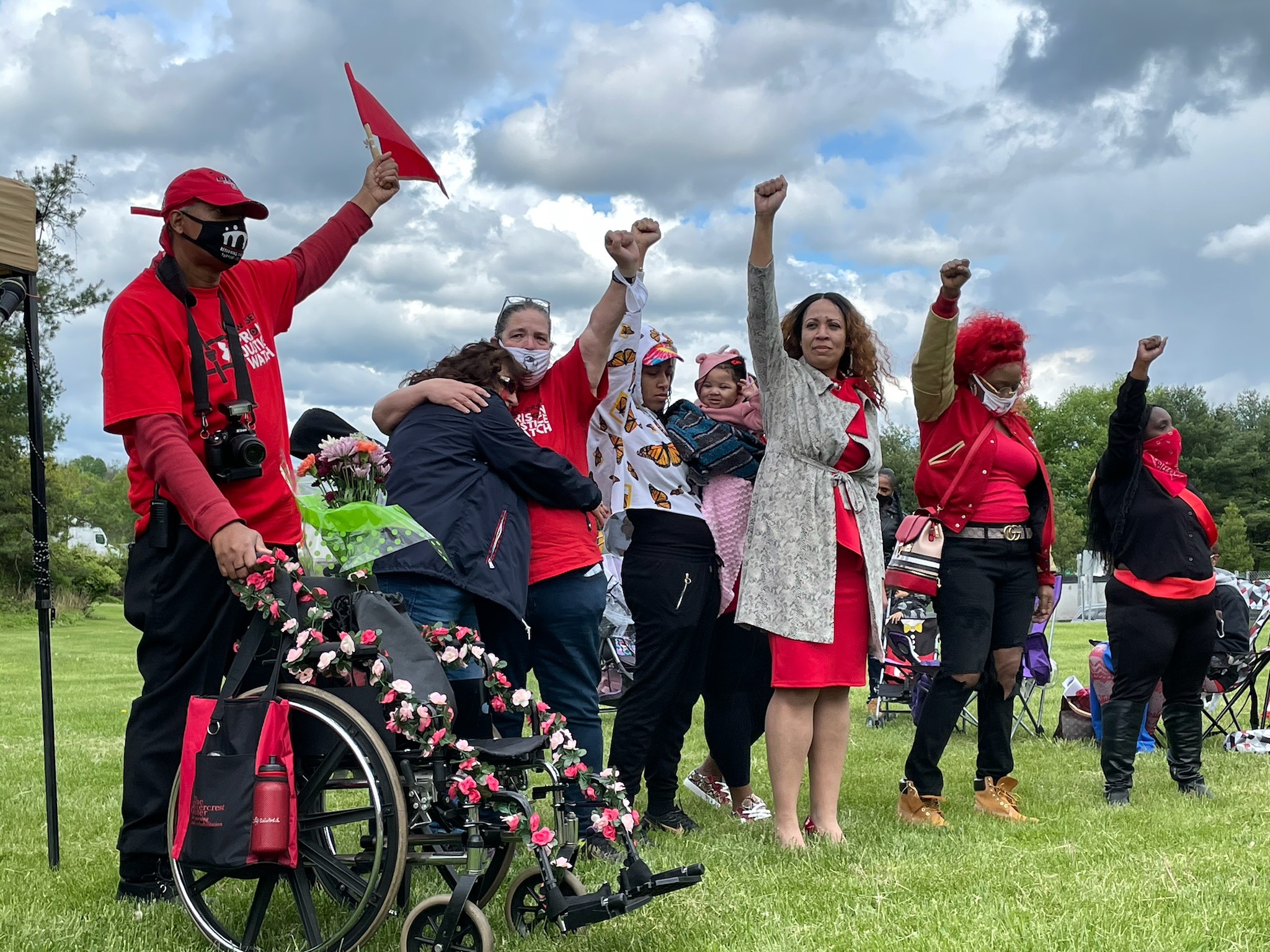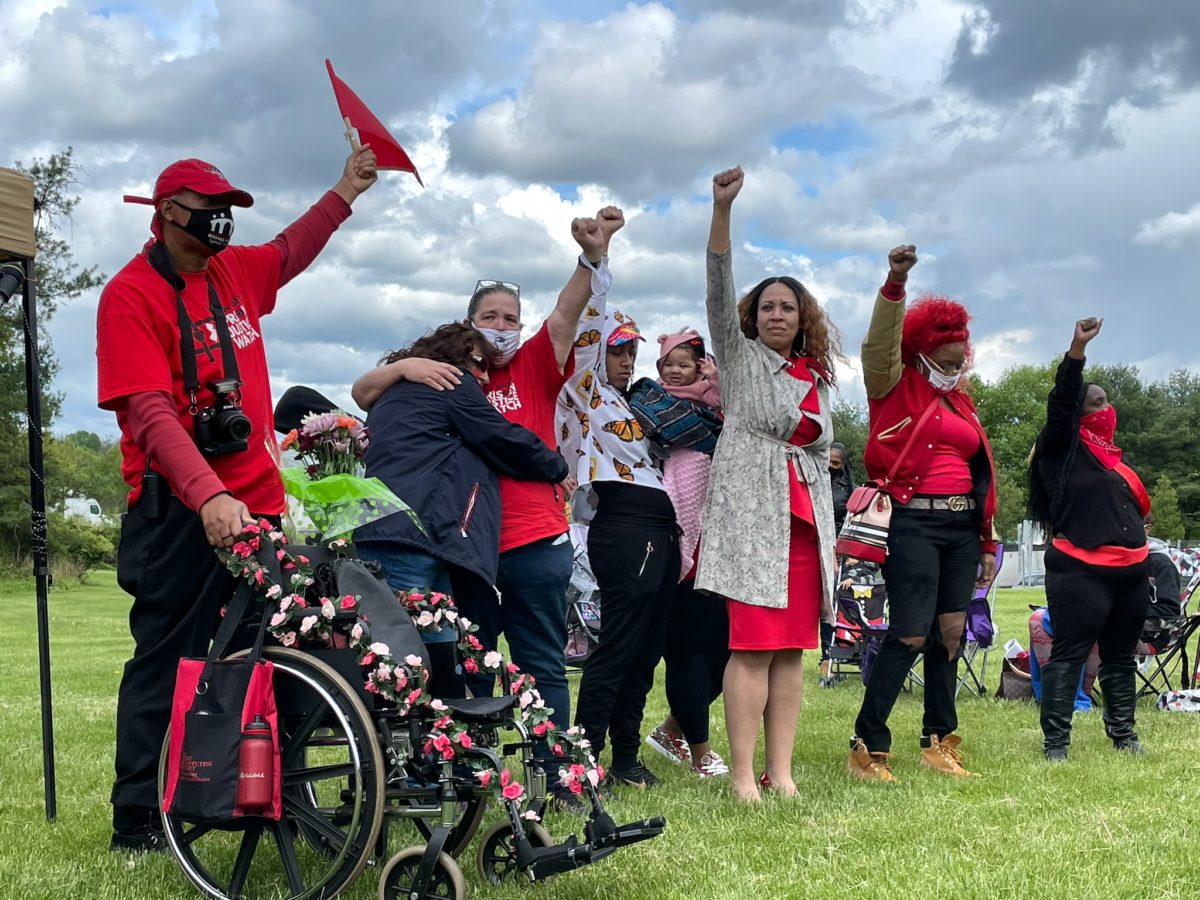Newsletter
People Are Being Tortured Inside New Jersey’s Prisons
Inside New Jersey’s Bayside State Prison, corrections officer John Makos allegedly tortured incarcerated kitchen workers. In one incident, he approximated a “crucifixion” by handcuffing his victim’s outstretched arms to fences and doors, then beat him, according to a criminal complaint issued by the Department of Justice last month.

The following text appeared in the third edition of our weekly newsletter. Sign up here.
The workers have taken over The Appeal.
We’re excited to bring you the third edition of our weekly newsletter as we continue to work toward an official relaunch.
Every dollar we raise brings us closer to producing vital journalism that helps communities address the harms of the criminal legal system. Help us return to reporting full time here.
We’re so excited to be back, and thanks again for sticking with us!

People Are Being Tortured Inside New Jersey’s Prisons
by Elizabeth Weill-Greenberg, The Appeal
Inside New Jersey’s Bayside State Prison, corrections officer John Makos allegedly tortured incarcerated kitchen workers. In one incident, he approximated a “crucifixion” by handcuffing his victim’s outstretched arms to fences and doors, then beat him, according to a criminal complaint issued by the Department of Justice last month.
Makos’s victims feared that if they spoke out, they might lose their job in the prison’s kitchen, which gave them access to more and better quality food, according to the DOJ complaint and an investigation by NJ Advance Media.
During the course of at least nine months in 2019, the complaint says:
- Makos ordered a victim to pull down his pants, then repeatedly spanked the man with a ruler with such force that the ruler broke. He later forced the victim to show his bruised buttocks to other incarcerated people.
- Makos told a victim that if he wanted to keep his job in the kitchen, he’d have to ride “the motorcycle.” He ordered the victim to put his back against the wall and sit, as if on a motorcycle. Makos then kicked him in the chest.
- To avoid a beating, another victim ate hot peppers that Makos brought to the prison.
Makos’s alleged actions aren’t an isolated incident of depravity. Corrections officers across the country regularly make headlines for egregious acts of cruelty like killing a mentally ill man by locking him in a scalding hot shower or putting a woman in an outdoor cage on a 107-degree day for four hours, killing her. What Makos is accused of doing is a symptom of an entrenched pattern of abuse inside the country’s prisons—abuse that disproportionately impacts people of color and haunts generations of survivors.
Nafeesah Goldsmith was incarcerated for more than a decade at Edna Mahan, New Jersey’s prison for women. She told The Appeal that she wasn’t surprised by the abuse at Bayside or that it occurred so openly for months.
“I’ve been desensitized when it comes down to just what officers of the DOC will do,” said Goldsmith, who is now chairperson of New Jersey Prison Justice Watch. “What is disheartening is the fact that this is something that is accepted—the fact that an individual feels that comfortable and has that kind of freedom at work to perform in such a manner that others are aware of it, your colleagues are aware of it.”
What happened at Bayside “speaks to a culture … that says that we are dispensable,” added Lydia Thornton, who was also imprisoned at Edna Mahan. “Because, after all, we’re criminals.”
Thornton works with New Jersey Prison Justice Watch and founded the advocacy group, The Scarlet F (the F stands for “felon.”)
That culture of dehumanization permeates New Jersey’s prisons. Last year, I wrote about a man incarcerated at Mid-State Correctional Facility who was handcuffed for days while he was hospitalized with COVID-19. In April, Akela Lacy reported for The Intercept that contaminated water at East Jersey State Prison likely caused a Legionnaires’ disease outbreak among the men housed there. And sexual assault has been rampant at Edna Mahan, according to a DOJ investigation. Just this month, a corrections officer was charged with sexually assaulting an incarcerated woman. Earlier this year, the state Department of Corrections entered into a preliminary multi-million dollar settlement with survivors.
Even while the DOJ was investigating Edna Mahan, the abuse continued unabated. On the night of Jan. 10 into the early morning hours of Jan. 11, correctional officers attacked several women; they cut off the victims’ clothes, punched them dozens of times, and pepper sprayed them as the women bled, cried, and pleaded for them to stop. The state attorney general’s office has charged 10 officers in connection with the assaults.
“It took a year and a half for this to even come out,” Thornton said of the abuse at Bayside. “I understand investigations have to happen. … But it seems to me that when it comes to us, the process slows down. We’re not quite as important.”
But survivors of New Jersey’s prisons are fighting back.
Goldsmith, Thornton, and other formerly incarcerated leaders championed a bill to restrict the use of solitary confinement, a common practice in prisons and jails throughout the country that the United Nations Human Rights Council has said can be tantamount to torture. In 2016, Governor Chris Christie vetoed the bill, but current Governor Phil Murphy later signed it in 2019. Last year, loved ones of those inside, along with formerly incarcerated people and their allies, held a funeral procession at the state Capitol to honor the incarcerated victims of COVID-19. Earlier this year, they protested outside Edna Mahan. They’ve demanded the release of thousands of people trapped inside New Jersey’s prisons and jails.
“We put human beings away in cages and behind giant walls and all that for public safety,” said Thornton. “And so that we can forget about them.”
The abuse of people who are incarcerated, whether in blue states like New Jersey or red states like Texas, will continue as long as elected officials—and the people who elect them—act as if a person living on the inside is less human than a person living on the outside.
Disclosure: From 2018 to 2019, Elizabeth Weill-Greenberg worked for New Jersey Campaign for Alternatives to Isolated Confinement, which advocated for the passage of the Isolated Confinement Restriction Act (A314/S3261.)
The New Jersey Department of Corrections has agreed to a preliminary multi-million dollar settlement in the Edna Mahan class action suit. Every person who spent a single day imprisoned at Edna Mahan since January 1, 2014, (through now) is entitled to at least $1,000—(and as much as $250,000). The deadline to file a claim is next week on Oct. 29, 2021. Click here to learn how to file a claim.
SUPPORT A WORKER-LED APPEAL DONATE
IN THE NEWS
Contact us at theappealteam@gmail.com so we can feature your work here!
A former Kansas City, Kansas, police detective has been accused of raping women and coercing women into giving false testimony. The detective, Roger Golubski, is now facing a grand jury investigation after the Kansas City Star repeatedly reported on the accusations against Golubski. [Dan Margolies and Steve Vockrodt / Kansas City Star]
Recently released body-camera footage shows police officers in Dayton, Ohio, ripping a paraplegic Black man out of his car by his hair. The city’s police union has since defended the cops filmed brutalizing the man, Clifford Owensby. [Jen Balduf / Dayton Daily News]
The COVID-19 pandemic led to a 500 percent increase in the use of solitary confinement in prisons under the guise of “medical isolation,” a Solitary Watch report warns. “In some ways, the COVID-19 unit was worse than the hole, a term used to describe solitary confinement in prisons and jails and which is used as a form of punishment,” HuffPost wrote. [Jessica Schulberg and Christopher Blackwell / HuffPost]
Arizona Department of Corrections Special Operations training materials are full of offensive imagery, including patches with skulls and shotguns on them. The materials also include a training video showing Special Operations officers pepper-spraying imprisoned people set to Guns N’ Roses’ “Welcome to the Jungle.” [Jimmy Jenkins / Arizona Republic]
The crisis inside New York City’s Rikers Island jail complex is much deeper than previously reported. The COVID-19 pandemic and the rollback of bail reform exacerbated an extant staffing issue—and guards have stopped supervising entire wings of the facility. Although some have noted that detained people have used the crisis to take better care of one another, incarcerated people have also been victims of violence and neglect inside the compound. [Jan Ransom, Jonah E. Bromwich, and Rebecca Davis O’Brien / New York Times]
A group of New York state lawmakers is pushing to make all prison phone calls free. Imprisoned people in New York (and their loved ones) pay among the highest rates for phone calls in the country. [Rachel M. Cohen / New York Focus]
Overtime pay for NYPD officers is costing the city hundreds of millions of dollars per year, even as the practice encourages over-policing, takes resources from other social services, and has no clear effect on public safety. [Fola Akinnibi, Sarah Holder, and Christopher Cannon / Bloomberg]
City of Miami Police Chief Art Acevedo, a former chief of the Houston and Austin police departments in Texas, was fired weeks after writing a memorandum accusing multiple Miami politicians of corruption and misusing the police department for personal gain. (Acevedo further stated that he would be alerting “the proper authorities.”) Acevedo had been on the job for about six months. [Joshua Ceballos / Miami New Times]
The Philadelphia City Council on Thursday became the first big city in America to ban police from pulling people over for low-level, “pretextual” driving offenses—such as broken tail lights or improperly displayed registration stickers. According to the Defender Association of Philadelphia, the new law could eliminate around 300,000 police interactions with civilians each year. [Sean Collins Walsh / Philadelphia Inquirer]
That’s all for this week. Feel free to leave us some feedback, and if you want to support our official relaunch, please donate here. Until next time, the work continues.
